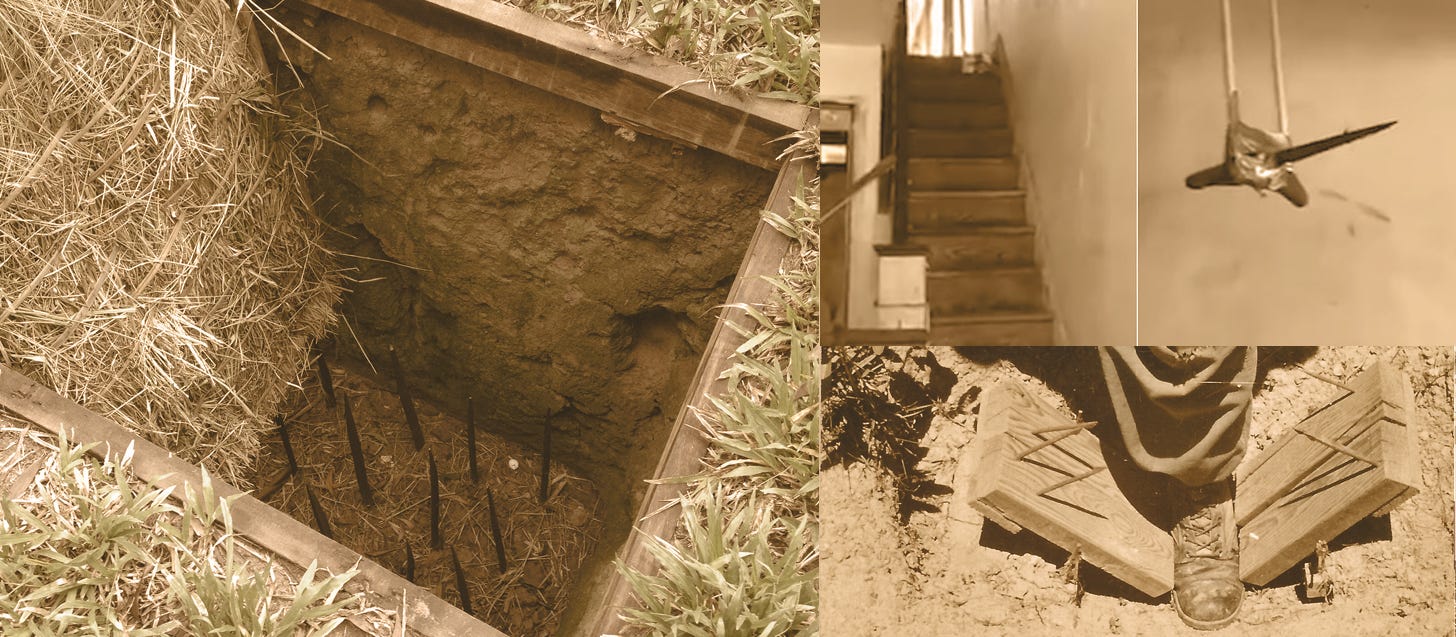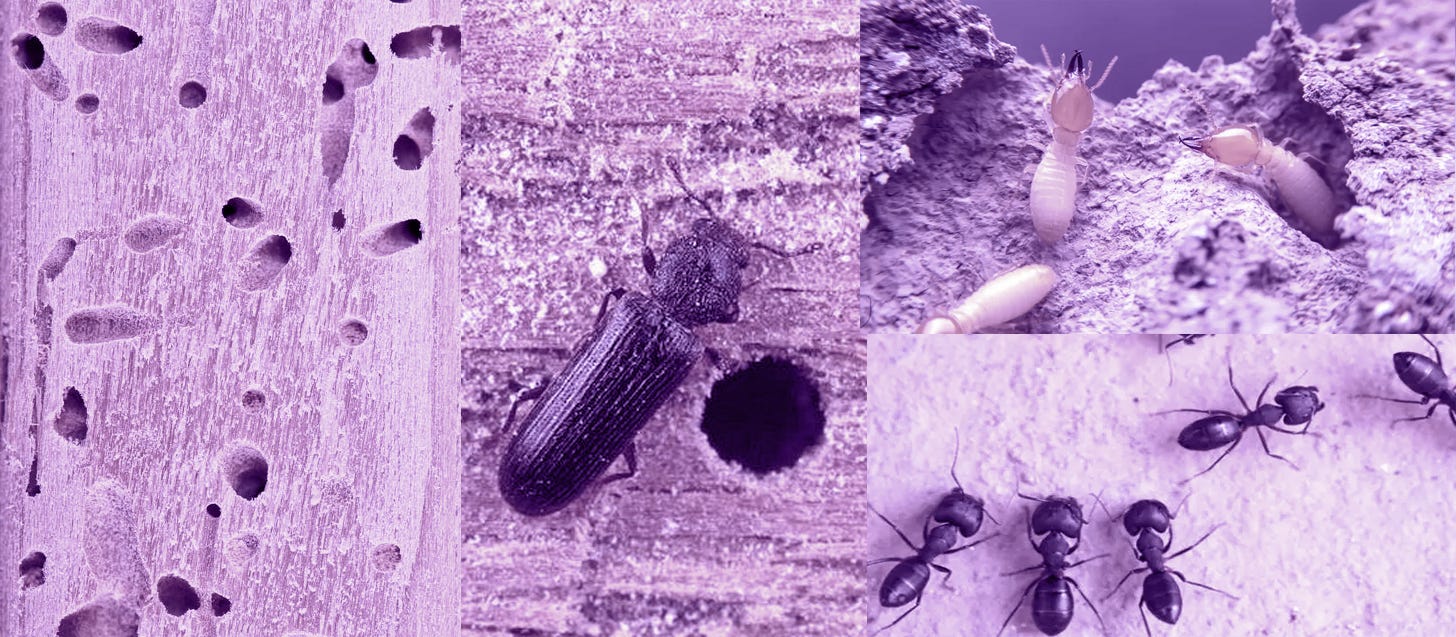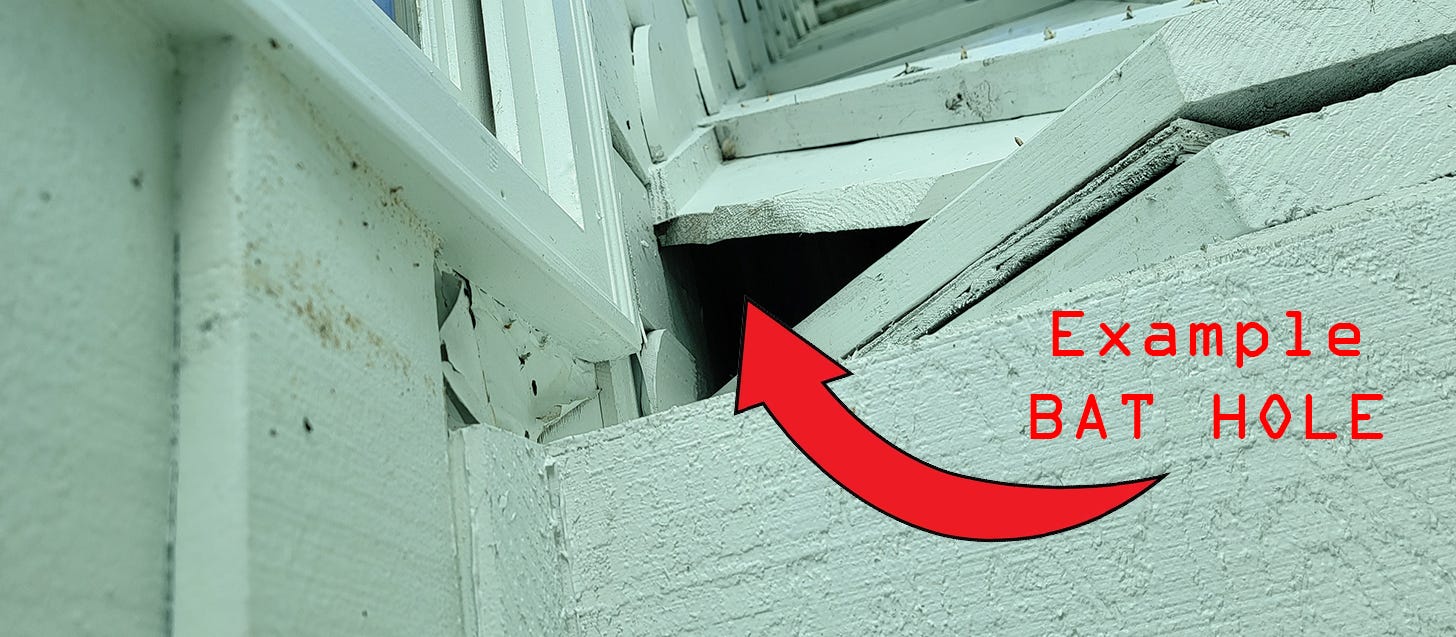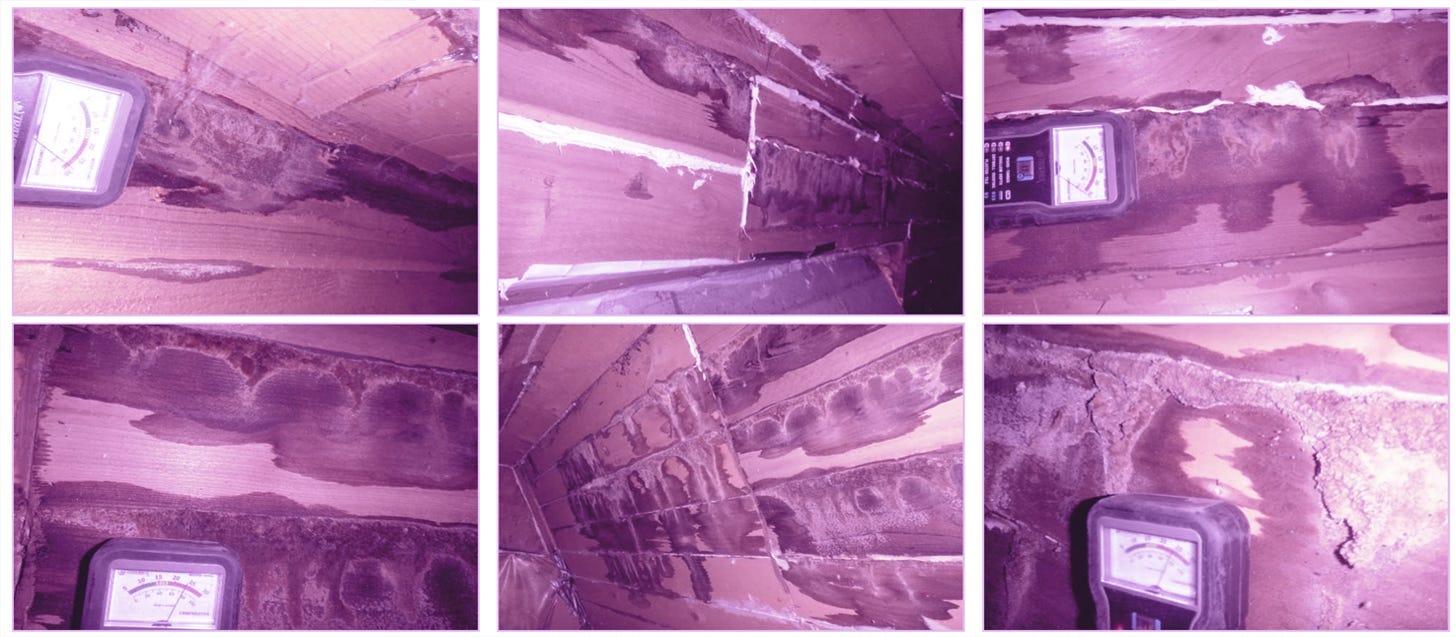PSA: Learn how to avoid buying a bat-infested mansion!
'Going Batty' Act I Chapter 1 || PSA: Learn how to avoid buying a bat-infested mansion!
For a summary about what this is about, please read this!
This post is a continuation, a specific chapter in our unfolding story, dealing with a bat occupation and the mess they left for us.
Before we get into the heart of our story, before you get to know us and our trials, let me first open with some frank advice and general knowledge that could spare you or someone you know from a similar fate. Consider this a public service announcement.
Our particular situation was invariably complicated, and you'll see why as you read into this book. However, there's three important points you need to know about. These are the practical points that you need to know about. For our emotional journey, you'll have to keep reading.
One, find a third party inspector and scrutinize everything. Trust nobody when buying a house.
Two, estate home sales can be very risky. Act accordingly.
Three, bats are different from other pests. They can be easier or harder depending on how your house was built.
More on the first point, not all home inspections are the same. In some states it legislated that your buying agent can't recommend the inspector. For most states, that's not the case. Many states are "buyer beware," which means if you intend to buy a home, it’s up to you to find all the problems with that house before committing.
Agent recommended inspectors may have special relationships with the agents. Be selective, maybe have two inspections done. When you get the document, highlight every recommendation from the inspector, however vague. You are legally responsible to do all of those actions. Your inspector is protecting themselves, your agent and the seller, not you.
No one in a real estate transaction has your best interests in mind except you. Housing is a racket, you are the sucker. Hedge your bets and protect yourself. Depending on the market conditions, you might be pressured to buy without an inspection. If you go that route, have an amount equal to the down payment ready to go for repairs, because there will be repairs. If you can't afford that, prepare to get scrappy.
Second point, estate home sales are a gamble. What I mean by that is if the house is being sold by an estate, for most states, there is an exemption for the seller providing a disclosure. Even in regular sales, the seller is probably not going to be one-hundred-percent honest.
For estate managed home sales, the heirs could literally spend multiple years turning the house a death trap and suffer zero liability. That's what happened to us. If you want to kill or harm someone and get away with it, selling your parent's house after they die is your best chance. If you're a sociopathic serial killer who enjoys making money from human suffering, your ideal career path should be real estate.
As a buyer from an estate, just realize going in that you need to spend double the amount of time, attention and money on your inspection. Assume the sellers and their agent are setting "booby-traps" and want to cause you both physical and financial harm. This has happened literally in a few shocking cases that occasionally make the news.
In an estate-sale scenario, it’s not just that no one has your back, it's that they literally have their knives out and the lights have just been turned off. The legal system will not save you. Period. Plan accordingly.
The third point - know your pests. Understand the signs of each type. Assume your home inspector does not know anything about pests or wildlife. They probably don't. If you see anything on your inspection indicating pests, regardless of how soft the language or how minor the pictures, call a professional.
If your timeline doesn't allow for a professional in pest management or wildlife control to come out, here's what you need to know. For insects, ask if your pest professionals have an entomologist on staff. That's the fancy name for "someone who studies bugs." You'll want to be on the lookout out for wood-eating insects.
When there are little traces of scat, understand that bats are not "rodents" and their motivations are not the same. Mice and rats can burrow, they can chew their way into new areas. They are after your food, and will typically be lower down in your house. Your basement, your crawlspace, your pantry, your kitchen.
Bats don't care about your food. They eat bugs. Bats want one thing from your house. The same thing you do. Warmth and shelter. If they are living in your house, it’s because they think it’s their house. If your situation is anything like ours, the bats are probably right. It is their house.
With bats, there are varying degrees of legality when it comes to killing them. It varies state by state, and depending on whether they are in a living space or a storage or commercial space. If they are in a shed, a barn, a garage, a warehouse, chances are you aren't legally allowed to kill them. When they are in your house, it tends to be disdainfully permitted.
The question you need to ask yourself is, do you really want to kill them? We decided the ethical thing to do was to wait them out and then seal our house. If you subscribe to a different set of ethics, fine, but I would still advise you consider the methods and consequences. If you want to listen to the cries of dying baby bats inside your walls, seal away. If you're comfortable living around poison gas, well, have your cup of tea and enjoy your miserable life.
With rodents, you can set traps. With bats, the only thing that can catch them are nets. That doesn't work inside a house. What most wildlife control officers do is a process called "exclusion." What this looks like is a person or group of contractors putting hardware cloth over everything. They leave one or two exits where the bat must crawl through a plastic tunnel, so it’s possible to escape but very hard to find their way back in.
Dealing with bats is never the same. It's all based around how the house was built. They can squeeze into holes an eighth of an inch. Little brown bats are tiny, they can get in almost anywhere. If you have any problems with your roof or siding, they will show you. They are tricky, inventive little critters, but they don't chew their way in. Science says they won't tunnel, although I have seen them push small chunks of insulation out of existing holes.
In consideration of real estate, here's what to look out for. First, any signs of discoloration in drywall near the upper walls, particularly in a roof gable. Second, any dingy smells or a large number of flies. Third - anything that looks like "water damage" despite an apparently in-tact roof.
NOTE: THAT IS NOT, I SAY NOT WATER DAMAGE. IT IS BAT URINE.
Now, from my experience talking to others that have had similar problems as us, there are two big factors which attract bats. Bats eat bugs. Bugs show up near water. If you are near water, especially in an open field type area, there will be bats. The good news is that they will keep the mosquito population down. Thank you bats.
The other thing they like is warmth. They are also attracted to flowing air. Think about it, a cave in the night will have warmer air inside the outside. Warm air rises, and will push out of either a cave or some other enclosed space. Hairs on the bats' wing membrane function as airflow sensors. They notice the moving air while flying and shoot right in.
This is why bats often will fly into houses when someone opens a window or door. They are drawn to the change in pressure and temperature. Now, I'll cover this later, but different vent systems on a roof allow warm air to escape in different ways. Some vent types are easier to seal up properly than others.
Nothing, by my experience, is worse for bat management than "ridge vent." Why? Think of a normal vent at a single fixed point as a waterfall coming down a mountain. There's flow, but it’s in a limited area. The ridge vent, by comparison, is Niagara Falls. It is one long surface area of flowing air. Heat from your home is successfully dispersed, but that means it shoots into the night like a beacon to the bats.
Check out this video - they have footage of vents like ours with bats moving in and out:
Not only do those vents create more airflow, they also are harder to install in a way that does not introduce gaps. The slope of the vent and that of the roof have to match, otherwise there will be buckling and small gaps. Those vents are not only shooting out like a spotlight, they are a like a bunch of open doors on a sport stadium. Unlike a baseball game though, this is the wrong type of bat you want to see.
In combination, a house near to water with poorly installed ridge vents, is a recipe for disaster. If you live in a northern latitude area and your house gets direct sunlight in the summer, that's a third strike. If you have all three of those conditions and don't have any bats, you probably just aren't looking hard enough. There's a home run bound to happen shortly. Your batting average will improve.
Lastly, if you do happen to find a lot of "scat" in your house, it can be hard to tell bats from mice or rodents. Bats are not rodents, by the way. The big difference is that rodent poo is hard. It takes a lot more force to crush. Bat poo will easily disintegrate into a fine brown powder. It smooshes easily.
There are, of course, many other things to consider when buying a home or dealing with bats. You'll have to just keep reading to find out more. Those are the big take-aways though. If somehow, in some way, this information helps you, then I consider my good deed accomplished. Maybe I'd just close out with insisting you take a fixed rate loan. Anything else is financial suicide.
There's also the whole issue of home owner’s insurance. Most states require it when you take out a mortgage. However, the list of situations that insurance will cover is decreasing over time while the costs are skyrocketing. There are also fewer providers and more monopolies, with tendrils into politics. For reason's we'll cover later, this situation will only worsen.
Real estate agents aren't actually all monsters. It's just that the real estate market is riddled with perverse incentives and seller-oriented protections. Home prices will always be high so long as commission is based on sales price. Sellers will always hide health risks and severe home defects as long as they know the laws that cover their immoral activity. There are no lemon laws for houses. Ethics are a laughable externality.
In short, people are jerks. Bats at least eat bugs and pollinate flowers. Bats are better than most people. Bats don't lie to you. Bats just do bat stuff.
In closing, I'd just say that caring for a newborn while trying to decide on a house is almost like an impairment. The sleep deprivation can cause bad decisions to be made. However, when we bought our bat-riddled house, we were watching interest rates jump up a percentage point every two months. The growing monthly rate was scarier than the army of bats, in retrospect.
Learn from our bad decisions, then go make your own different ones. Be careful, ask questions, cover your bases. Either learn to navigate the darkness, lest you become like us, the creatures of the night.










